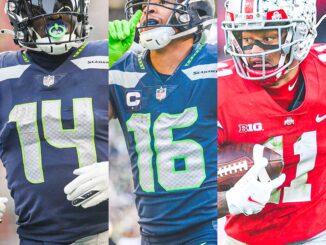
Over the course of the week, the Seattle Seahawks announced that they were parting ways with offensive coordinator Darrell Bevell and assistant head coach/offensive line coach Tom Cable. Reactions by Seahawks fans on social media were mixed, as all reactions on social media tend to be, but with a discernable majority favoring the moves. While The Seattle Times pointed out that during the tandem’s tenure, the team set franchise records in single season offense – rushing yards in 2014, total yards in 2015, and passing yards in 2016 – it would be safe to say that the majority of the league probably set franchise records for offense at some point over the past seven years in the NFL’s pass happy environment. But, how did the Seahawks offense compare to the rest of the league during that period?
Darrell Bevell’s Offense
The offensive numbers that stand out are not the cumulative numbers on the ground or through the air, but the efficiency numbers versus the rest of the league. At the start of the Seahawks most recent playoff window (dynasty if you insist), the heralded Seahawks defense was establishing itself as an elite squad, perhaps of historical greatness, going from 29th in DVOA (Defense-adjusted Value Over Average) in 2010 to 10th in 2011. That first season, the offense barely improved from also occupying 29th place in 2010 to 22nd in 2011.
But much to Bevell’s credit, the offense did take off in his second year, jumping from 22nd in DVOA in 2011 to 4th in 2012. The subsequent years included efficiency on offense that earned the Seahawks 7th best in the NFL in 2013, 5th best in 2014, THE best in 2015, and then a decline to 16th best in the league in 2016, and finishing out as the 14th most efficient unit this past season, before Bevell was relieved of his duties.
Tom Cable’s Offensive Line
The proficiency arc of the offensive line under Cable is similar to that of the offense as a whole. In 2011, Cable’s first season, the Seahawks finished 20th in the league in adjusted line yards, although they were second best in the league in “Power Ranking,” a stat that measures 3rd and 4th down conversions. In his second season, Cable’s line was the 4th most efficient in the league in run blocking. The line remained efficient for a few years, finishing 9th in adjusted line yards in 2013, 4th in 2014, and 4th again in 2015. The drop off that would cost Cable his job began in 2016 when the Seahawks line finished 26th in the league in adjusted line yards and, finally, 31st out of 32 teams this past season.
Who’s to Blame?
Many Seahawks fans never forgave Darrell Bevell for not calling Marshawn Lynch’s number on the goal line in the Super Bowl against the New England Patriots. But, it seems highly unlikely that a single play, no matter how important, emotionally charged, and ultimately unpopular in the eyes of the fans and some defensive teammates alike, affected the performance of the Seahawks offense three years later.
Many other critics of the team the past two seasons have pointed out that as the defense got paid over the years, the amount of money going to anyone not named Russell Wilson declined precipitously on the offensive unit, especially the O-line.
It’s probably safe to say that very few, if any, teams in recent years have signed offensive linemen with no college or high school football experience. But, in the deep dive game of sports trivial pursuit, probably only residents of the Pacific Northwest or transplants from there could answer George Fant when posed with such an outrageous premise. The Seahawks, saddled by enormous contracts on defense, have employed some “creative” solutions to the salary cap at the expense of the offense, including basketball players as left tackles.
Between the Super Bowl years of the 2013 and 2014 seasons, the Seahawks payroll grew from the 18th highest in the league to the 11th highest payroll in the league, but also went from allocating 52.6% for offense in 2013 to spending just 36.1% on offense in 2014. This past season, the Seahawks carried the second highest payroll in the NFL and spent 46.7% on offense. Only the Jacksonville Jaguars spent more total money on defense.
So, maybe spending is out of whack and the front office just needs to provide the new offensive regime, whoever that may be, with some more talent.
The counter argument though is that the Jaguars, the Kansas City Chiefs, the Los Angeles Rams, the Tennessee Titans, and the Minnesota Vikings all spent more on defense than on offense and they all made the playoffs, with three of the five still playing this weekend. So, it can be done, even with Blake Bortles or Marcus Mariota as your quarterback.
It’s Complex
The real answer, however, is that it’s a mixture of things. It’s complex. Like any relationship, things get stale. They get old. It was time for Bevell and Cable to go, even if it wasn’t completely their fault the offense stank in 2017. And firing Bevell and Cable doesn’t absolve blame elsewhere.
Yes, the Seahawks need a talent upgrade on the offensive line. But that includes talent acquisition, not just coaching up basketball players converted to left tackles. And, it also includes adding talent at the skill positions, especially running back, to take advantage of any improvements on the line.
At the same time, the Seahawks are facing a youthful insurrection in their own division. While the Rams may have lost their first playoff game in Los Angeles, they should be a force in the NFC West for a few years to come. And, the San Francisco 49ers and on the come with Jimmy Garoppolo at QB. The ‘Hawks split with the Rams in ’17 and were lucky to only face Garoppololess Niners this season. The road ahead appears harder than in past seasons, or even this season.
The bottom line is that while it may feel good to Seahawks fans, for now, to be rid of the obvious targets of their ire on the coaching staff, a quick improvement is far from guaranteed. The new OC and OLC will have their work cut out for them.





The genuine answer, in any case, is that it’s a blend of things. It’s unpredictable. Like any relationship, things get stale. They get old. It was the ideal opportunity for Bevell and Cable to go, regardless of whether it wasn’t totally their blame the offense stank in 2017. Also, terminating Bevell and Cable doesn’t vindicate accuse somewhere else.